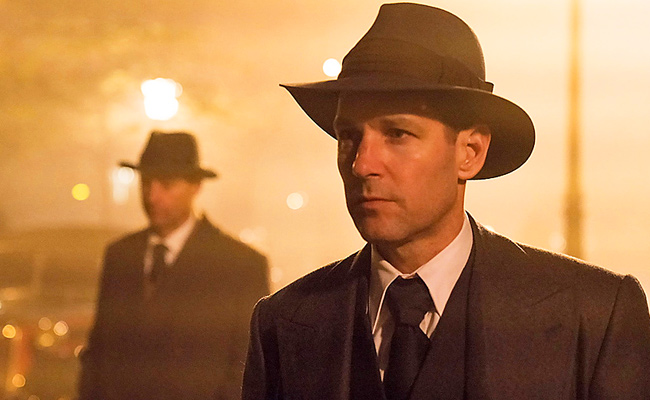
In Knocked Up, there’s a discussion of the most badass Jews in cinema, with the boys singing the praises of Steven Spielberg’s Munich. “If any of us get laid tonight,” Seth Rogen’s Ben Stone tells his friends, “it will be because of Eric Bana in Munich.”
The Catcher Was A Spy feels like a movie created specifically for that Seth Rogen character. It’s about a thoroughly badass Jew, played by real-life Jewish heartthrob Paul Rudd (who’s so adorably on brand that he used to DJ bat mitvahs). And the best part is, it’s a true story. But The Catcher Was A Spy is more than just Jewish wish fulfillment. Directed by Ben Lewin, who last came to Sundance with the underseen and thoroughly delightful The Sessions, Catcher is great for giving guys like fictional Seth Rogen the confidence to get laid at bars, sure, but it’s also a step forward for the entire genre.
More than just being cool and badass and suave, Rudd’s character is a new kind of action hero. Not only does he subtly redefine masculinity, he subverts 70 years of war movies telling us that the hero is the most bellicose, the guy who can spot evil in the enemy when the rest of the world still sees a friend. Catcher tells us that heroism isn’t always about having the courage to act; sometimes it’s the courage not to overreact. It’s a conventional hero’s journey about an unconventional hero.
Rudd plays Morris “Moe” Berg, a catcher for the Boston Red Sox whose modest baseball acumen was eclipsed by his intriguing backstory — that he was a graduate of Princeton and the Sorbonne who read 10 newspapers a day, was fluent in more foreign languages than anyone could keep track of, and if that didn’t beat all, he could also juggle. The real-life Moe Berg was a husky six-footer, making the fine-boned and actor-sized Rudd a less than ideal fit if the goal was a literal visual match. (There’s a 30 for 30 short about Berg, in addition to the non-fiction book on which this movie was based.) Clearly a literal lookalike wasn’t the goal, as evidenced by the fact that the film doesn’t bother fitting Rudd with the real Berg’s iconic, righteous unibrow. Nor is Rudd’s baseball swing particularly impressive. But Berg was a career .243 hitter with six total home runs, so it’s not as if the guy playing him needed to be thick. Tonally, Rudd is a fit, and the artistic choice is clear: this was a guy who got by on brains and craftiness, not brawn. A little less complicated than the reality, but the reality was complicated enough.
Did I mention Berg was bisexual? (According to this film, anyway.) Early on, a young teammate tries to follow Berg — presumably to a gay club, but it’s left ambiguous — but Berg catches him in the act and beats the bejesus out of him. This seems to be retribution more for the kid’s invasion of Berg’s privacy than his homophobia. Of Berg’s true sexuality we get only clues — a sex scene with his girlfriend, Stella (played by Sienna Miller, who seems to specialize in the neglected woman lately); chaste but portentous hand-holding with a Japanese man. In all honesty, the movie could’ve used a gay sex scene, just to balance things out. Either way, the implication is clear: Moe Berg f*cked. And he didn’t really discriminate. You have to respect that in an action hero.
The reality is, sex has always been intertwined with spycraft, and it was by no means just the straight kind from Bond films. Could the film have made more of this, the connection between fluid sexuality and counterintelligence? Or between the skills one learned in concealing one’s sexuality in those days and the skills necessary for maintaining a cover? (Among others, two of the Cambridge five are understood to have been gay.) Perhaps, but the strand is there if you want to pull it. And, in the end, it’s all a bit ambiguous, just like Berg himself. The film doesn’t try to alter Berg’s most essential quality, that he was a mystery.
That Berg can be an enigma despite being a media darling who juggled for reporters and went on promotional tours to Japan is another of Catcher‘s compelling and insightful twists. The film is sneakily innovative like that throughout, offering subtle alterations to established formula even if it doesn’t scream “transgressive.”
I don’t want to reveal too much about Berg’s mission, since you could easily look it up and spoil the ending. Suffice it to say, it involves Berg stuck between a character played by Jeff Bridges and one played by Mark Strong. Berg ends up in a literal and figurative chess match with Strong, which is the film’s only glaring weakness. Can we stop doing the chess-match-as-metaphor thing in spy movies, please? It’s about as subtle as a sledgehammer and as useful as decaf.
The chess match is a lazily chosen visual device, but it doesn’t ruin what’s otherwise a good story, well told. Paul Rudd’s Moe Berg is handsome and athletic and worldly and tough and talented in almost unlimited capacity, from linguistics to physics. And in that way, he’s an update on those Jewish badasses in Munich. But he’s also a corrective to them. Because at its most basic, Munich, based on the book Vengeance, was a revenge movie. It specifically equated toughness and badassery with ruthlessness and killing. The Catcher Was A Spy, without spoiling anything, tells us something different.
In addition to revealing an entirely new facet of Paul Rudd’s adorableness, The Catcher Was A Spy is a movie that doesn’t confuse toughness with being hetero, “badassness” with murder, or courage with vengeance. It’s a poignant message, delivered simply.
